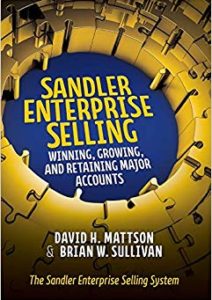It’s the end of the year. The holidays loom, the weather cools and we’re inundated with articles about how to close the year strong. The five, ten or twenty best strategies are outlined in checklists to ensure end-of-year success. Contact every client is an action often suggested as is going back to prospects who had chosen another vendor. Another popular bit of advice is to ask for referrals and every article includes the news flash to conduct account business review meetings (more on that later). Of course, there’s some value in that gaggle of ideas that are duplicated across the litany of articles. More or less.
Think about your clients – the targets of those magical actions. How do you think they feel about the flurry of vendor calls they receive at this time of year? Do they feel special to be contacted by multiple reps, all requesting the same things? You know the answer. Clients are smart business people who, by the way, are extremely busy at year-end and don’t appreciate self-serving intrusions on their time. Self-serving? Is that a bit harsh? Not when the sales reps’ objectives are to close the year strong. Their year!
Perhaps the most meaningful thing to understand in serving clients, especially enterprise accounts, is that it’s not about you. Sales reps who don’t internalize that message are sniffed out by clients a mile away, just like the aroma of a skunk. They’re the reps making those self-serving calls in attempts to close their year strong. Yes, they’re easily spotted and they’re long remembered.
So, how can you close the year strong in a way that respects your clients’ interests? You can start by focusing on three strategies that benefit both you and your accounts:
- Know the Numbers – Close to 70% of US companies follow calendar budgets, meaning a full 30% don’t. In the public sector, the US Government tracks October to September while Canada’s government schedule runs April through March. Japanese and Australian firms follow very different formats and universities often align to academic calendars. To add complexity, many companies utilizing calendar budgets align with government schedules for engagements with their public sector clients. So, before you start suggesting “end of the year” reviews or discount programs, don’t embarrass yourself. Be sure it really is the end of the year. And if the closing of a client’s funding year is really approaching, the flow of the new year’s funds is right around the corner. As such, knowing your client’s ordering patterns, pains and overall needs is mandatory. Significant mutual benefit can result from proactively suggesting purchases with unused funds before year-end as “use it or lose it” often applies. Some organizations will even pay “pre-bills” in the current year for new year deliveries to avoid losing funds. By the same token, if this year’s funds are depleted but client needs remain, suggesting ordering and delivery now with payment due in the new year can be another powerful proposition. Knowing your client and what’s required earns you the right to have these meaningful year-end conversations versus those prescriptive close-the-year strong ideas.
- Work the Channels – Jay McBain, Forrester’s Principal Analyst for Channels, Partnerships, and Alliances, states that 75% of world trade flows through indirect channels. Whatever your percentage is, it’s likely increasing. So, at year-end, it’s critical to engage with your channel partners for territory and account planning. Your mindset should be that your partners are your clients and you are theirs. As such, your focus should not be on what you’ll do to them but what you’ll do with them. This strategic communication with major channel partners is a fundamental end-of-year activity. Collaborate, close strong and set the stage for a fruitful Q1.
- Review the Value – Too often, end-of-year reviews are nothing more than thinly-veiled attempts to squeeze more business out of an account. If that’s the intent, clients will see through the veneer quickly. If you’re fortunate enough to get client executives to attend one of these self-serving sessions, it will be their last. And as mentioned earlier, they will remember. So, flip the script and focus on value instead of business – value in the clients Don’t conduct business reviews but instead conduct value reviews, structured around the value the client expected of you in the recent past and the value they depend on you to deliver in the upcoming period. It’s amazing how reviews structured around client value almost always also uncover new business opportunities. Focus on the client and good will come of it.
Close the year strong? Of course. But never at the expense of your client and always with a clear focus on mutual benefit and the future. And never forget, it’s not about you.












Comments